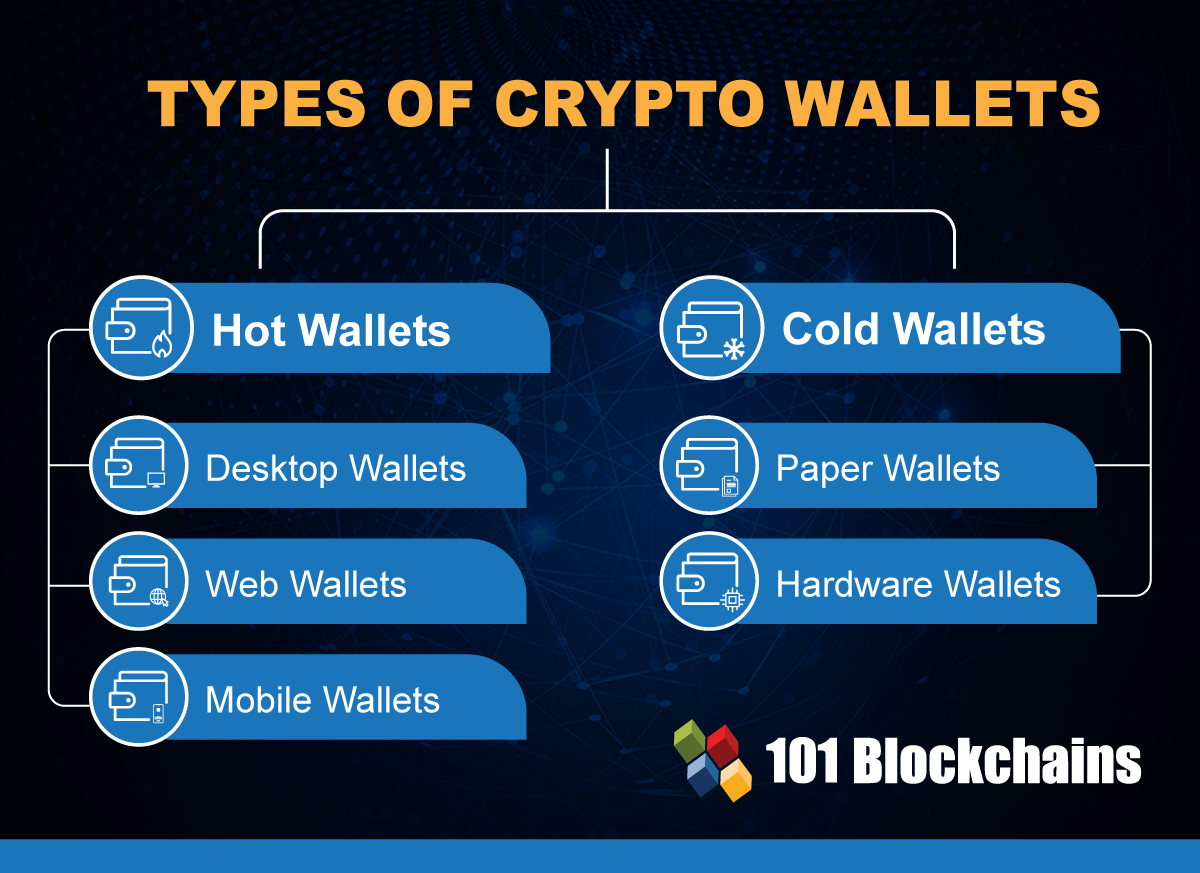Learn how blockchain truly works, master key definitions, and uncover what makes smart contracts so "smart." Dive into the fundamentals, gain valuable insights, and start your blockchain journey today!

- Cryptocurrency
Diego Geroni
- on October 29, 2021
Know Everything about Crypto Wallet
Many renowned analytics platforms have pointed out the formidable levels of growth in the crypto market since 2017. Cryptocurrency has evolved into more than just an alternative to cash, and today, we have many cryptocurrencies with interesting use cases. The continuously growing recognition of cryptocurrencies has prompted a healthy growth in attention on the crypto wallet and its uses.
You need a wallet to store your cash and debit cards or credit cards. So, where can you store your crypto assets? The answer points you toward a cryptocurrency wallet. The following discussion will help you explore the basics of crypto wallets and understand their different types.
Curious to know the impact and in-depth understanding of crypto compliance in businesses? Enroll Now in Crypto Compliance Fundamentals Course.
What is Crypto Wallet?
You can enter into the world of cryptocurrencies by purchasing crypto on a crypto exchange or trading platform. In such cases, you can leave the ‘keys’ for your crypto assets within the account. However, you can also choose to move them to your own crypto wallet. So, let us begin by reflecting on the definition of crypto wallets.
Cryptocurrency wallets are the same as your regular wallets. The only difference is that they are used for storing digital currency. From a technical perspective, crypto wallets are basically application software intended for storing and retrieving your crypto assets.
It is also important to remember that your crypto wallets don’t store your crypto assets like your physical wallet holds cash or credit cards. On the contrary, a cryptocurrency wallet actually stores the digital credentials you would need for accessing crypto tokens. Basically, the wallet serves as machine-readable proof of ownership of your coins.
Want to become a Cryptocurrency expert? Enroll Now in Cryptocurrency Fundamentals Course
Working of Crypto Wallets
The next important factor beyond ‘what is crypto wallet’ would take you to the working of crypto wallets. As you have noticed here, crypto wallets do not store crypto-assets like your physical wallets store cash or credit cards. As a matter of fact, cryptocurrencies are never stored in a specific location or have a physical form. All you can find are the records of the transactions documented on the blockchain.
A cryptocurrency wallet is a software program, which stores the public and private keys of an individual. The wallets also help users in interfacing with different blockchains for monitoring their assets and trading with them. Public and private keys serve as the foundation of crypto wallets.
The public key is basically your wallet address and serves as a bank account number of the user. You could share the public key with other people so that they can make payments to your wallet. The public key can also help others withdraw funds from your account with your authorization. People could view the public keys in the form of a wallet address, which is more like a compressed or hashed version of the public key.
However, the private key in a crypto wallet is the same as the password for your bank account or the PIN for your debit card. The private keys offer access to your cryptocurrencies alongside sending or receiving cryptocurrencies.
Build your identity as a certified blockchain expert with 101 Blockchains’ Blockchain Certifications designed to provide enhanced career prospects.
Importance of Crypto Wallets
The importance of crypto wallets is clearly evident in the fact that they serve as an efficient storage mechanism for crypto assets. Crypto wallets do not store crypto assets directly, and you have the assets securely stored on the blockchain. A cryptocurrency wallet lets you control access to your crypto assets on the blockchain with private keys. Therefore, crypto wallets definitely offer a formidable instrument for the secure storage of cryptocurrencies.
Another aspect that solidifies the importance of crypto wallets refers to the flexibility for interfacing with different blockchains. You can see how your cryptocurrencies are fluctuating in value, thereby offering better prospects in trading.
Types of Crypto Wallets
Any guide on crypto wallets would be incomplete without a discussion on crypto wallet types. You can discover different types of crypto storage options according to your requirements and plans with your crypto. Here are some of the notable types of cryptocurrency wallets that you can find for different use cases.
-
Hardware Wallet
Hardware wallets, also referred to as cold wallets, can offer completely offline storage for your keys. You can find hardware wallets similar to a USB device in terms of design. In some cases, paper-based hardware wallets are also suitable for storing crypto. A paper-based crypto wallet is nothing but the documentation of your public and private keys on a piece of paper.
Generally, investors perceive hardware wallets as the proven instrument for safeguarding their digital assets. Since hardware wallets are offline, they present limited vulnerabilities for hacking. However, you also have the risk of loss or theft of your hardware wallet.
-
Software Wallet
You can find software wallets or hot wallets like your online bank account. Generally, software wallets are connected with an exchange with user-friendly interfaces. Software wallets or hot wallets have played a crucial role in opening up the crypto sphere to the mainstream market. Interestingly, you could also find many software crypto wallet types with different methods for using them. You could access a software wallet directly through a crypto exchange, which you use for buying crypto tokens.
Another common type of software crypto wallets refers to desktop wallets, which you can use by downloading a software application on your desktop. You could also choose a smartphone application for accessing your software wallet. Although software wallets provide flexibility in managing crypto assets alongside higher availability and accessibility, they are highly vulnerable. The software crypto wallet types are connected to the internet, thereby risking the exposure or theft of your private keys. Therefore, you have a higher risk of hacking with software cryptocurrency wallets.
Get familiar with the terms related to cryptocurrency with Cryptocurrency Flashcards
Are Crypto Wallets Really Necessary?
Various crypto exchanges offer the facility of storing your cryptocurrencies in a wallet on the exchange. Some people don’t even think of choosing a crypto wallet for storing their cryptocurrency. How reasonable is it to store your valuable crypto assets in a wallet on crypto exchanges? This is where you would hesitate to put your valuable assets in an online forum where they are more vulnerable to hacking. On the other hand, you need to understand the need for a learning curve when you are thinking about crypto.
If you don’t have a comprehensive understanding of hot and cold storage, public and private keys, and other security-related topics in the crypto, then you need to learn them. Until then, a wallet on the crypto exchange you use could be a reasonable option. However, you should not rely completely on the exchanges and look for cryptocurrency wallet options that fit your bill. On the other hand, some crypto exchanges have introduced security measures for safeguarding your assets. Furthermore, some exchanges also provide insurance coverage on crypto holdings, with some of them also using cold storage methods.
Security of Cryptocurrency Wallets
The primary concern with choosing a crypto wallet largely focuses on security. If you look closely, all crypto wallets provide security to different extents. The degree of security in cryptocurrency wallets depends largely on the type of wallet and the service provider. The online environment is definitely riskier than the offline environment for storing your crypto assets.
Online wallets are vulnerable due to their connectivity to the internet, as hackers could compromise your private keys. On the other hand, offline wallets are not connected to the internet, thereby reducing the risk of hacking. However, offline wallets could be stolen, or you could lose them and end up losing access to your cryptocurrencies. So, the most important question you should ask is, “Is any cryptocurrency wallet truly secure?” before passing judgment on crypto wallets.
Want to know the answers to some of the commonly asked questions about cryptocurrency? Check the detailed guide on Frequently Asked Questions About Cryptocurrency
Best Ways to Secure Crypto Wallets
If you are trying to use a crypto wallet, then you should follow the diligent security precautions in any type of wallet you use. All you need to know is that losing your private keys would lead to the loss of your crypto assets. Here are some of the best practices for securing your cryptocurrency wallets.
-
Take Backup
One of the foremost recommendations for safeguarding your cryptocurrency wallet would point to take backup of your wallet. Store a major share of your cryptocurrency in a high-security environment like cold storage. Use hot wallets for storing small amounts of crypto, which you can use for transactions. Offline storage options could help you backup your hot wallets, thereby enabling you to recover lost wallets.
-
Software Updates and Security Layers
Using a hot wallet or software wallet comes with many inherent risks. So, you need to prepare your wallet for any type of possible attack with software updates or security enhancements. In addition, you can also add more layers of security with methods such as two-factor authentication or additional PIN for accessing your wallet application.
Bottom Line
Crypto adoption is growing at a drastic pace, and many notable enterprise players are joining in the play. As the popularity of cryptocurrencies continues to grow, people want to explore the domain. A crypto wallet can offer a gateway for beginners to explore the domain of cryptocurrencies. It is basically a repository for your public and private keys, which you need to access your crypto assets on a blockchain.
The different variants of crypto wallets present multiple opportunities for managing your crypto assets. However, you need to proceed with caution while choosing crypto wallets and maintain a focus on the security of your assets. Learn about the crypto wallets and find the right one for you now!
*Disclaimer: The article should not be taken as, and is not intended to provide any investment advice. Claims made in this article do not constitute investment advice and should not be taken as such. 101 Blockchains shall not be responsible for any loss sustained by any person who relies on this article. Do your own research!






